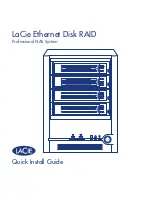
81
Security Level:
This setting determines which IP Filter rules take effect, based on the security
level specified in each rule. For example, when High is selected, only those rules that are
assigned a security value of High will be in effect. The same is true for the Medium and Low
settings. When None is selected, IP Filtering is disabled.
Private/Public/DMZ Default Action:
This setting specifies a default action to be taken
(Accept or Deny) on private, public, or DMZ-type device interfaces when they receive packets
that do not match any of the filtering rules. You can specify a different default action for each
interface type. (You specify an interface's type when you create the interface; see the PPP
configuration page, for example.)
z
A
public
interface typically connects to the Internet. PPP, EoA, and IPoA interfaces are
typically public. Packets received on a public interface are subject to the most restrictive
set of firewall protections defined in the software. Typically, the global setting for public
interfaces is Deny, so that all accesses to your LAN initiated from external computers are
denied (discarded at the public interface), except for those allowed by a specific IP Filter
rule.
z
A
private
interface connects to your LAN, such as the Ethernet interface. Packets
















































